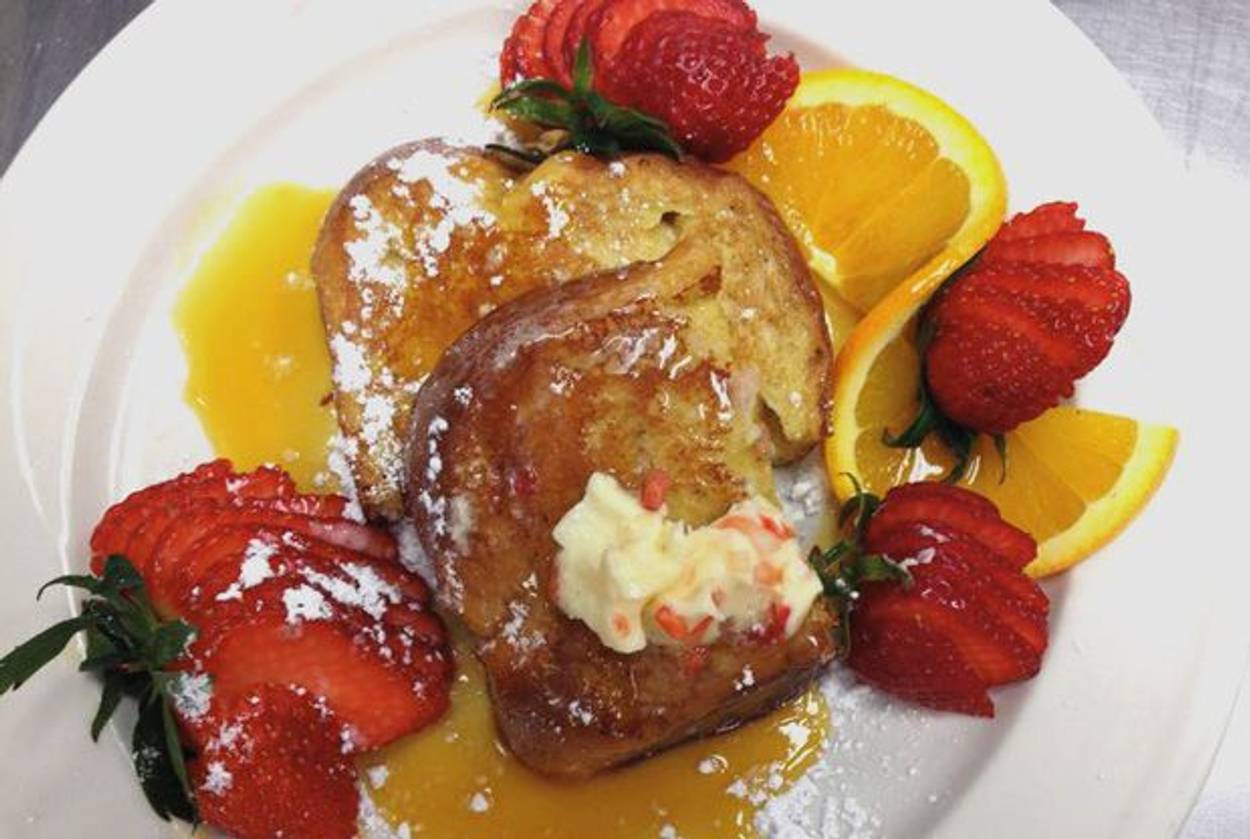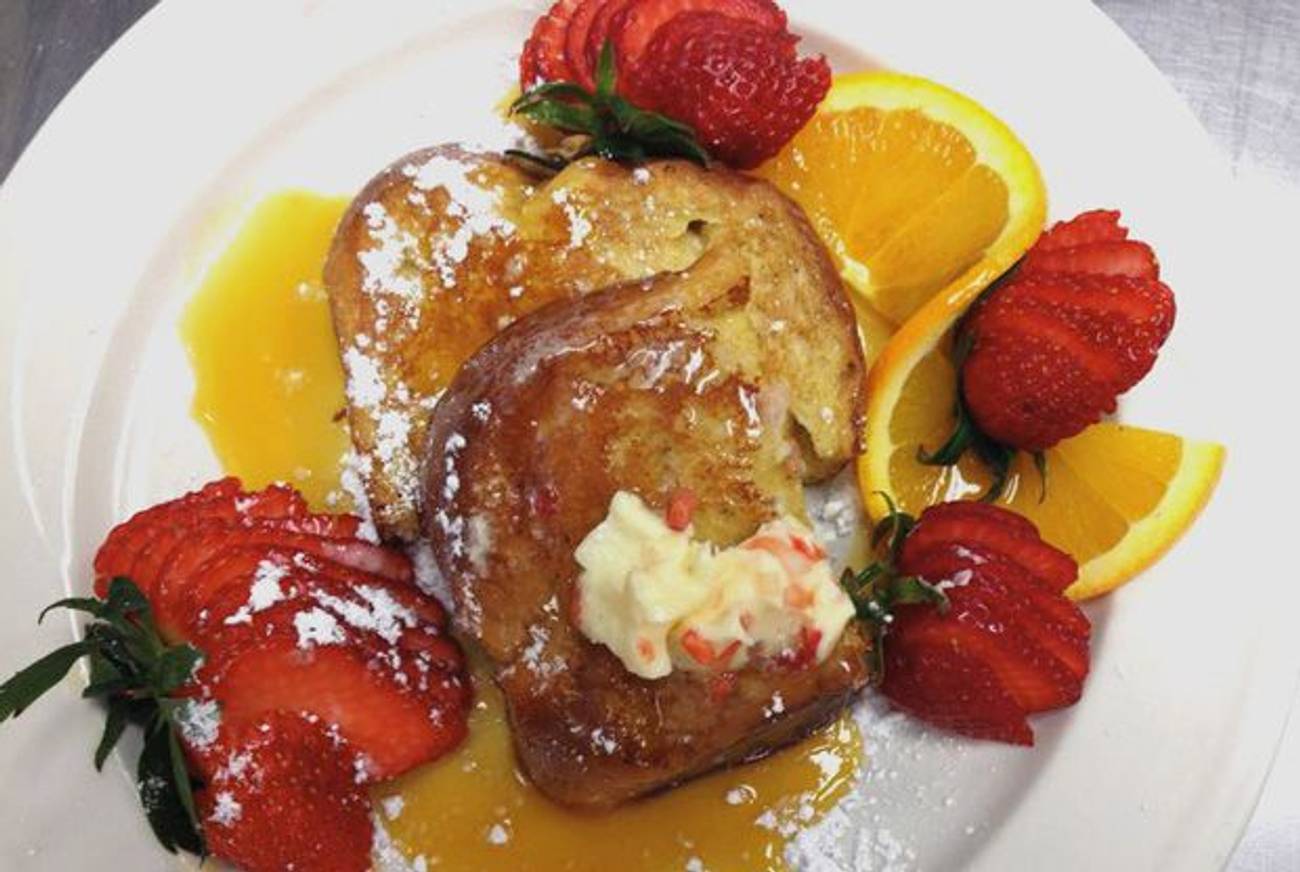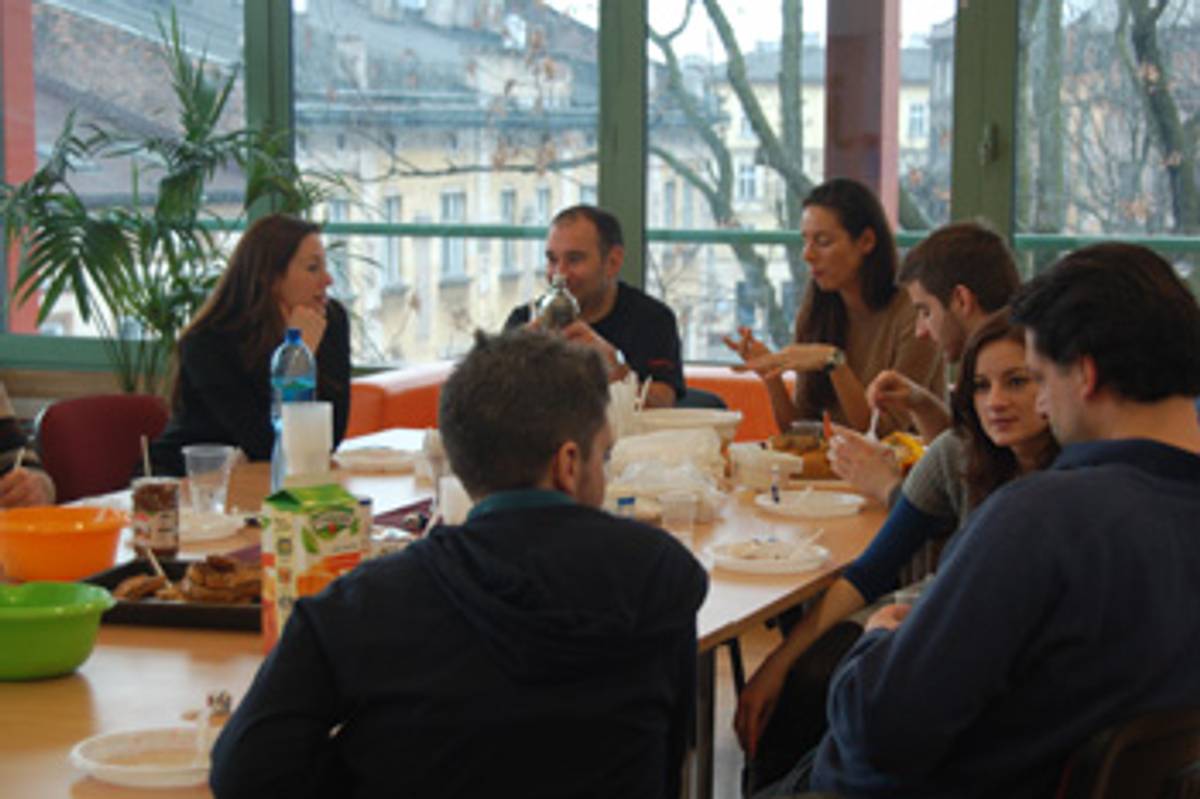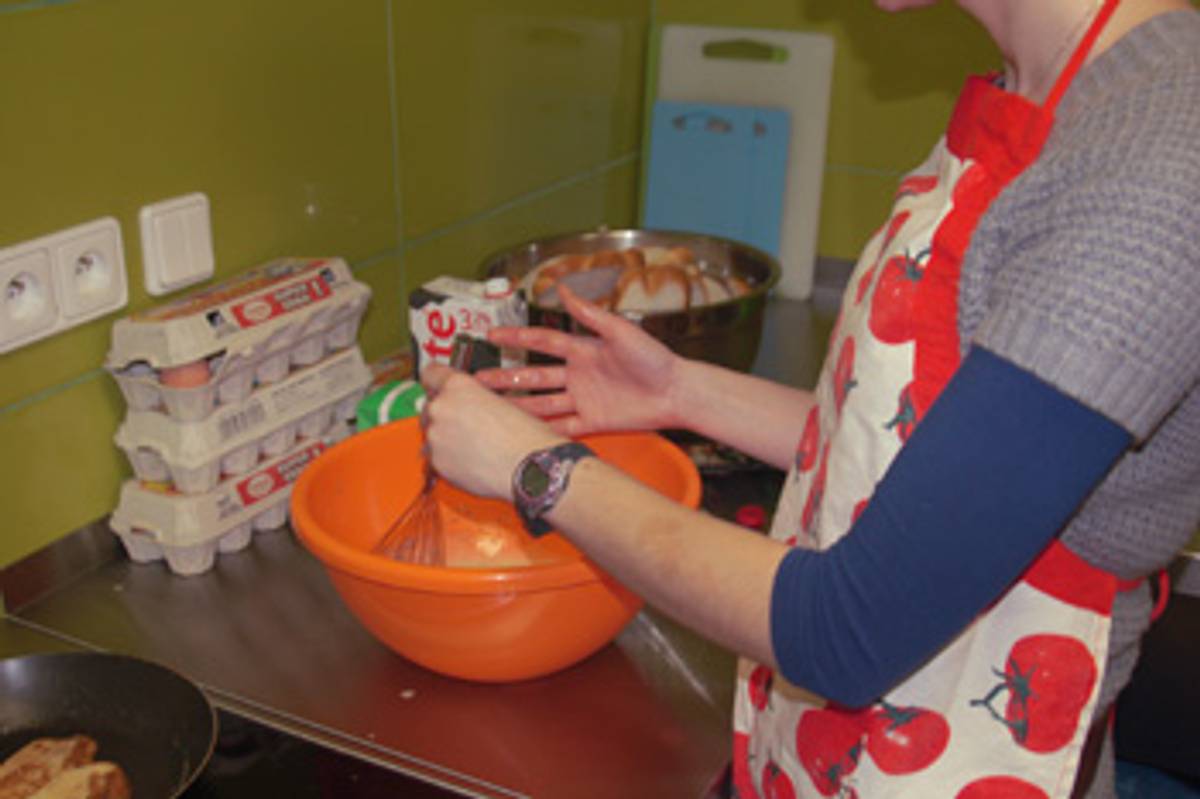Brunch Comes to Poland
Polish has no word for a leisurely, late-morning meal, but brunch is catching on in Krakow, with french toast, stiff drinks, and schmoozing




When I joined the Jewish Community Center in Krakow last year, few people there had even heard of brunch. Now the community has developed a real taste for brunch—and the connections it fosters.
Brunch, as most Americans know, is a unique meal, with its own typical dishes, its own special hour, and a distinct style of conversation. JCC Director Jonathan Ornstein was immediately enthusiastic when I pitched the idea of organizing a Sunday brunch six months ago—not surprising, since he’s a native New Yorker. Post-communist identity in Poland is still evolving, and Ornstein says many people here are just learning about and exploring their Jewish roots. Brunch seemed like an ideal setting for this. “In a place that is often defined by its past, I see people streaming back to reconnect with their Judaism,” said Ornstein. “That is what brunch is about: connecting to community. And schmoozing.”
New York University professor Barbara Kirshenblatt-Gimblett, who is currently leading the exhibition development for Warsaw’s Museum of the History of the Polish Jews, agrees that brunch is uniquely suited to bring the community together in a new way—in this case, a way that younger generations, in particular, can mingle. “Breakfast and lunch aren’t festive enough for Sunday, a day which is meaningless to Jews, but brunch is perfect because you can get up late,” she said. “Brunch is not just a meal, it’s an informal and social tradition that brings people together … and anything that brings people together in Poland is good.”
***
Preparing for brunch begins the day before with shopping, and shopping for kosher food, something new for me, requires a bit of help.
“There are two important lists here,” Ornstein tells me. “Schindler’s and Schudrich’s.”
I’m already familiar with the first one, from seeing the film Schindler’s List, which is credited with transforming Krakow’s former Jewish quarter Kazimierz into a tourist attraction that Ornstein calls “Jewrassic Park.” (Many tourists tend to visit more filming locations than actual historical sites, a pattern I refer to as the Schindler Effect.) But the second list is more relevant for brunch: Chief Rabbi of Poland Michael Schudrich’s list of kosher products sold in Poland. I take it to the grocery store, along with my shopping list and my closest friend here, Joanna Sliwa—who is bilingual. Sliwa is moving to Warsaw next week, so this week’s brunch has a theme in her honor: sliwka, meaning plum, from sliwa, a plum tree. She helps me decipher the difference between smietana (sour cream) and smietanka (heavy cream), the latter being a key ingredient in the meal we’ll be preparing. We are relieved that maple syrup, a delicacy in Poland and a brunch essential, is available—and kosher.
Bakeries all over Poland still sell chałka (challah), which is a testament to how embedded Jewish culture is, even though the Jewish population today is sometimes estimated to be as low as 30,000. But not many people in Poland have sampled that ultimate American brunch staple, french toast. When Jan Kirschenbaum, a local student from Wrocław who runs the JCC Students Club, savored his first bite of challah french toast smothered with Nutella and topped with bananas at brunch, he told me, “Wow … now I get it!” This aha! moment has since been repeated by several other first-timers.

A few minutes after noon on a recent Sunday, a group has gathered on the sun-filled top floor of the JCC, a colorful building that overlooks the stunning prewar façades of Kazimierz. There are a few regulars who are JCC members, including Ornstein and Michael Newmark, a Brooklyn-born Ph.D. student of mixed Polish-Jewish ancestry who typically prepares brunch with us. There are also some newcomers, including a Viennese friend with Polish roots who spent three years in Israel, and Michael’s Polish cousins from nearby Katowice, who have never been to any event at a Jewish institution. Jan Rozwadowski, a local student who comes to the JCC weekly, is also a loyal brunch attendee; today he comes early and arranges the spread: Canadian maple syrup, Nutella, Ukrainian shampanskoye (champagne) and orange juice for mimosas, yogurt, apple-sliwka cereal, and chocolate-covered sliwka.
Aside from the special plum theme, this is now a fairly typical scene for our brunches, which we’ve held at the JCC every few weeks since November. The conversations around the table are a blend of Polish, English, sometimes even Hebrew. The attendees, typically 10 to 20 people, are a mix of Polish JCC members who are highly involved in the Jewish community, and American students and expats, many of whom speak Polish. Diverse identities intertwine here, unlike in other places, where customs have the ability to segregate rather than unite. We have more than 30 people on our Facebook page, and the number continues to grow; there is no Polish word for brunch, so we invented one to describe the event on Facebook: brancz.
By 12:45, Adam Popiel, who hosts a local radio show Power Nap, appears in uniform: massive headphones around his neck. He grew up in Massachusetts to Polish parents, who are thrilled he’s connecting to the Jewish community after living here for almost a decade. JCC staffer Kasia Leonardi wanders in shortly after. She usually attends with her mother and sister, who all prepare the weekly Shabbat meals that draw more than 70 people to the JCC. While Shabbat draws a wide spectrum of people from various age groups, brunch typically attracts the younger generations. It’s not uncommon for people to stumble in hung-over after a Saturday night out.
Aside from these meals, the JCC hosts language classes and lectures, an active seniors club, and events for people of all ages. At the legendary JCC dance parties, rabbis and professors mingle among the imbibing, youthful crowd. When I moved here to conduct fieldwork for my master’s thesis on souvenirs and art representing Jews, I yearned to engage with the community, and that’s how I ended up joining the JCC—and soon after that, the JCC had its first brunch.
“Who is ready for Slivovitz?!” Ornstein asks, lifting up a slim glass bottle of plum brandy labeled in Hebrew. Joanna grins, then cowers in her seat. It’s barely after 1 p.m., but shots are poured and we toast: “L’chaim na zdrowie!” A few weeks earlier we’d sampled raspberry nalewka (traditional fruit-infused vodka), homemade by Sylwia Płucisz, who explained the art of nalewka-making. At upcoming brunches, we’ll be serving JCC Brunch Beer, specially branded and labeled for our events.

Adam’s semi-regular co-host Phil Manchester, a Brit who sometimes attends the JCC brunch, once told me, “It’s an American thing if you think alcohol is standard with brunch.” He’s right; even though the term “brunch” was coined in 1895 by an Englishman, after five years of eating brunch in New York before my move to Krakow, I’ve always adopted the American view that alcohol is part of the experience. That, and french toast; while we add other dishes to the menu from week to week—once, a fluffy banana-chocolate-chip cake made by local restaurateur Jerzy Lewinski was a highlight—the challah french toast is always available.
The timing, too, is a key part of any brunch: starting late, and staying for hours. Joanna’s farewell brunch lasts until almost 3 in the afternoon, typical for our gatherings, with people grazing and talking and grazing some more. Schmoozing, to use the Yiddish term—talking without any particular direction. “Brunch here is like Seinfeld,” Ornstein says, his youthful grin emerging. “It’s successful because the only agenda is no agenda, just letting people express themselves.”
As people start saying goodbyes, the few of us remaining clean up together. Some of us relocate into the kitchen, to continue the conversation while we wash dishes, and then we move on to our favorite local café, Cheder. Brunch usually ends this way, but today is particularly bittersweet because Joanna is leaving town. We’re discussing another event for the brunch crowd: challah grilled cheese with tomato soup for dinner, endorsed by brunch regulars and others who work Sundays and still want to partake in the schmoozing.
Joanna starts to chuckle and asks, “When’s my next trip to Krakow?”
Dara Bramson is a journalist covering Eastern Europe and Southeast Asia.